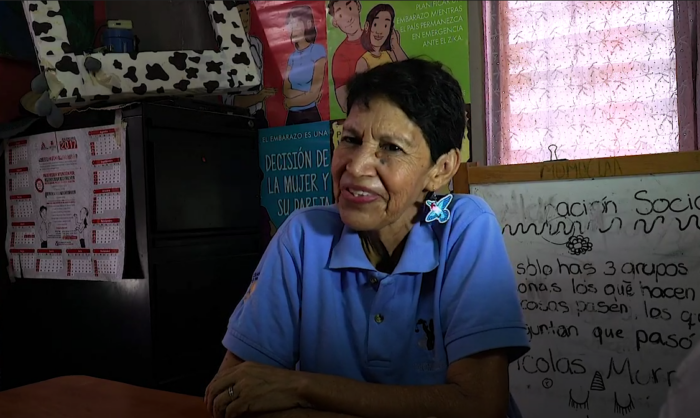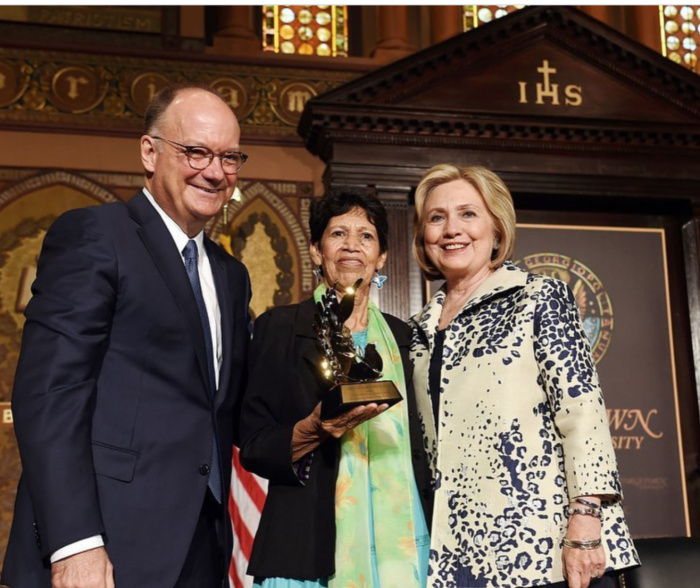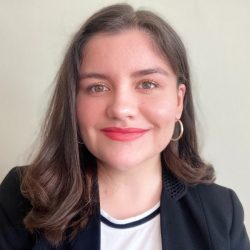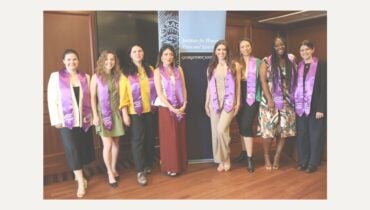How do we responsibly tell the stories of women on the front lines of peace and security? Translators and transcribers play a major role in efforts by the Georgetown Institute for Women, Peace and Security (GIWPS) to document and preserve the first-hand experiences of women peacebuilders from around the world. The project, titled Profiles in Peace, is a collection of oral histories with women who have become leaders in their communities during times of great difficulty, from the Iranian revolution to the civil war in El Salvador.
Two Georgetown graduate students in the Latin American Studies program, Nelcy Ávila and Anne-Cecilia Byrne, revealed what it’s like to be entrusted with the transcription and translation of a woman peacebuilder’s life story. Both students worked with GIWPS on the oral history of Virginia “Marta” Velásquez, a grassroots women’s rights activist from Choloma, Honduras, which is known as the deadliest place in the country for women. Over the years, Marta has recruited over 650 volunteers to help assist survivors of violence in the community with whatever they need, including legal, moral, and psychological support.

“The more that I listened to and watched the interview with Marta, the more she became a role model for me of what leadership should look like,” says Anne-Cecilia, who created the official English-language transcript of Marta’s oral history. Nelcy, who created the official Spanish-language transcript, adds, “Marta has altered the way I understand what it means to serve others in my community, my university, and my family. When I initially thought about service, it was always for the other, but she was also talking about service to the self.”
Providing transcripts—especially in the narrator’s native language—of a video interview is a critical step in the oral histories process. Transcripts not only make the material more accessible, they also give the narrator an opportunity to easily review the contents of the interview and flag sensitive information for removal prior to publication. By necessity, the transcription and translation process is collaborative and time-intensive, and the translators take this responsibility seriously. Anne-Cecilia describes her approach as follows: “I am a very detail-oriented person and my translation work style reflects that approach. For this project specifically, I watched the whole video through twice to acclimate myself with the style, dialect and intonation of the speaker… From there, I re-watch the video and pair it to the transcription. Once both are matched up, I start the translation process from Spanish to English. Usually I take a chunk of words and right above that initial transcription, I write out the translated version. That way I see both versions to make sure that one is aligning with the other.”
Even the most talented translators can face unique challenges with a project like Profiles in Peace. Anne-Cecilia explains, “It is important to note that languages change depending on environmental, geographical, and social factors. I have studied abroad in both Uruguay and Spain, as well as Costa Rica. The Spanish language has different intonations and phrasings. For words and colloquialisms which I did not immediately understand, I sought advice from other Spanish-speaking friends or family.”
Even for non-Spanish speakers, watching Marta’s video interview is a rich experience. As she tells her story, Marta’s voice is gentle and captivating, and her longtime passion for service comes across in her tone and expressive gestures. For nearly 50 years,, Marta has helped to meet the needs of women in her community through her organization, Mujeres de la Colonia López Arellano y Aledaños (MOMUCLAA). MOMUCLAA provides shelter and legal assistance to survivors of domestic violence, offers workshops on self-esteem and sex education, and provides mediation and deescalation, among other services.
“Marta’s wisdom and service to other women and families has been an incredible source of knowledge to me,” reflects Nelcy. “From providing assistance to women survivors of violence to healing from trauma from gang warfare in Honduras, she stated that: ‘it is not that we are not afraid; we are always fearful, but we learn to live with our fears.’ Her strength, wisdom, and resilience has built a kind of solidarity for oneself. Marta is speaking about loving your own vessel, building your notion of self-love and establishing boundaries against injustices.”
In 2019, Marta traveled to Washington, D.C. to accept the Hillary Rodham Clinton award from GIWPS for her efforts to create a more peaceful and secure world. Georgetown staff, faculty, and students were in attendance—including Nelcy. “On September 27, 2019, I distinctly remember seeing Virginia Marta Velásquez at the Hillary Clinton Rodham Clinton Awards. I immediately noticed the bright earrings she wore as she sat on stage, and if I remember correctly, these are the same pair she wore at her oral history interview. A year and a half later, I would have the honor to transcribe her video interview,” Nelcy says.

Both Nelcy and Anne-Cecilia agreed that documenting and preserving the oral histories of women peacebuilders like Marta is an important way to “write women back into history.”
“The project is an important avenue to access these stories that would have otherwise not been readily available,” says Anne-Cecilia.
“It is really exciting that Georgetown University’s Library will be home to this amazing oral history collection,” observes Nelcy. “I hope that in the future, students and community members listen to these oral histories because the way people speak is a form of knowledge. Marta shares universal themes that transcend time such as self-love, service to others, and finding the tools to overcome your fears.”
Marta’s oral history, along with the English and Spanish transcripts, are available in the Profiles in Peace collection at the Georgetown University Library. More oral histories will be added in the coming weeks and years.
Learn more about Nelcy and Anne-Cecilia

Nelcy Ávila is a recent graduate of the MA in Latin American Studies program at Georgetown University. She graduated in May 2021 with a concentration in History, Culture and Society. Nelcy has interned with the Organization of American States (OAS) at the Secretariat for Strengthening Democracy. At the OAS, Nelcy translated grant proposals, memorandums, and PowerPoint presentations presented to the National Assembly of Ecuador. Most recently, Nelcy interned with the IN Series, a non-profit opera company in Washington D.C. During her time there, she has participated as a judge for the Gabriela Mistral Youth Poetry Competition, marketed IN Series as the first opera company in the world to develop a virtual 2020-2021 performance season, and published a written blog post for the Library of Congress Hispanic Division. While at Georgetown, Nelcy co-edited, translated and coordinated outreach for Plaza Pública, a literary online journal from the Spanish and Portuguese Department at Georgetown University that publishes the work of renowned authors and poets from various regions, cultural traditions, and languages in the Americas.

Anne-Cecilia Byrne is a rising second-year M.A. candidate in Latin American Studies with a concentration in Governance and Leadership. Growing up in an Irish-Colombian family, she experienced the constant oral translation of both English and Spanish between her immediate family and the outside world. Learning the Spanish language in a more formal academic setting further improved her ability to switch languages. Through her college experience at John Carroll University, she studied abroad in Spain and Uruguay. Her first official experience in translation was through her work with Dr. Colin Swearingen at the Department of Political Science at John Carroll University. For him, she translated over 300 interviews and health reports for the medical Honduras Immersion Program from Spanish to English. Also at John Carroll, she worked for Center for Student Diversity and Inclusion, translating all of their marketing materials from English to Spanish. Anne-Cecilia currently serves as the Communications Chair for the Georgetown Women in International Affairs (GWIA) and the Vice President of the Latin American Foreign Affairs Association (LAFAA).
Evelyn Garrity is a Program and Communications Associate at the Georgetown Institute for Women, Peace and Security.


